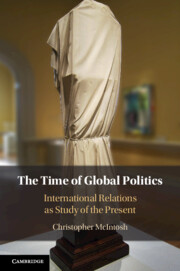Book contents
- The Time of Global Politics
- The Time of Global Politics
- Copyright page
- Contents
- Acknowledgments
- 1 Theorizing with the Present
- 2 The Temporal Imaginary of International Relations
- 3 A Presentist Approach to International Relations
- 4 The Temporality of IR Theories
- 5 The Time of War
- 6 Making America Great Again, Again, and Again
- 7 Beyond Disciplinary Prediction
- 8 Theorizing Responsibly
- Conclusion
- References
- Index
2 - The Temporal Imaginary of International Relations
Published online by Cambridge University Press: 23 November 2023
- The Time of Global Politics
- The Time of Global Politics
- Copyright page
- Contents
- Acknowledgments
- 1 Theorizing with the Present
- 2 The Temporal Imaginary of International Relations
- 3 A Presentist Approach to International Relations
- 4 The Temporality of IR Theories
- 5 The Time of War
- 6 Making America Great Again, Again, and Again
- 7 Beyond Disciplinary Prediction
- 8 Theorizing Responsibly
- Conclusion
- References
- Index
Summary
“The Temporal Imaginary of International Relations” identifies specific characteristics of the way IR conceptualizes time and temporality, along with the way it understands past, present, and future. It outlines the dominant representations of time and temporality within the discipline and shows how they produce a specific understanding of international politics as well as shape IR’s epistemological and ontological commitments. Trying to develop claims that travel from the past to the present/future reproduces a metaphysics of time privileging the past as the “reality” out of which the present and future grow. This chapter then outlines the drawbacks and negative implications of this representation, such as its difficulty with emergent phenomena and the emphasis on continuity in politics, theory, and ontology. This understanding of time makes theory more conservative and less able to deal with the entities, properties, and/or structures that break with the past. Epistemologically, new events only grudgingly disrupt previous orthodoxies because durational applicability is privileged. Finally, the chapter concludes by briefly mapping the field of IR via temporal commitments, providing a taxonomy for thinking about the temporal assumptions and implications of current theory, with a more detailed and concrete engagement with IR theory in the following chapters.
- Type
- Chapter
- Information
- The Time of Global PoliticsInternational Relations as Study of the Present, pp. 33 - 64Publisher: Cambridge University PressPrint publication year: 2023

